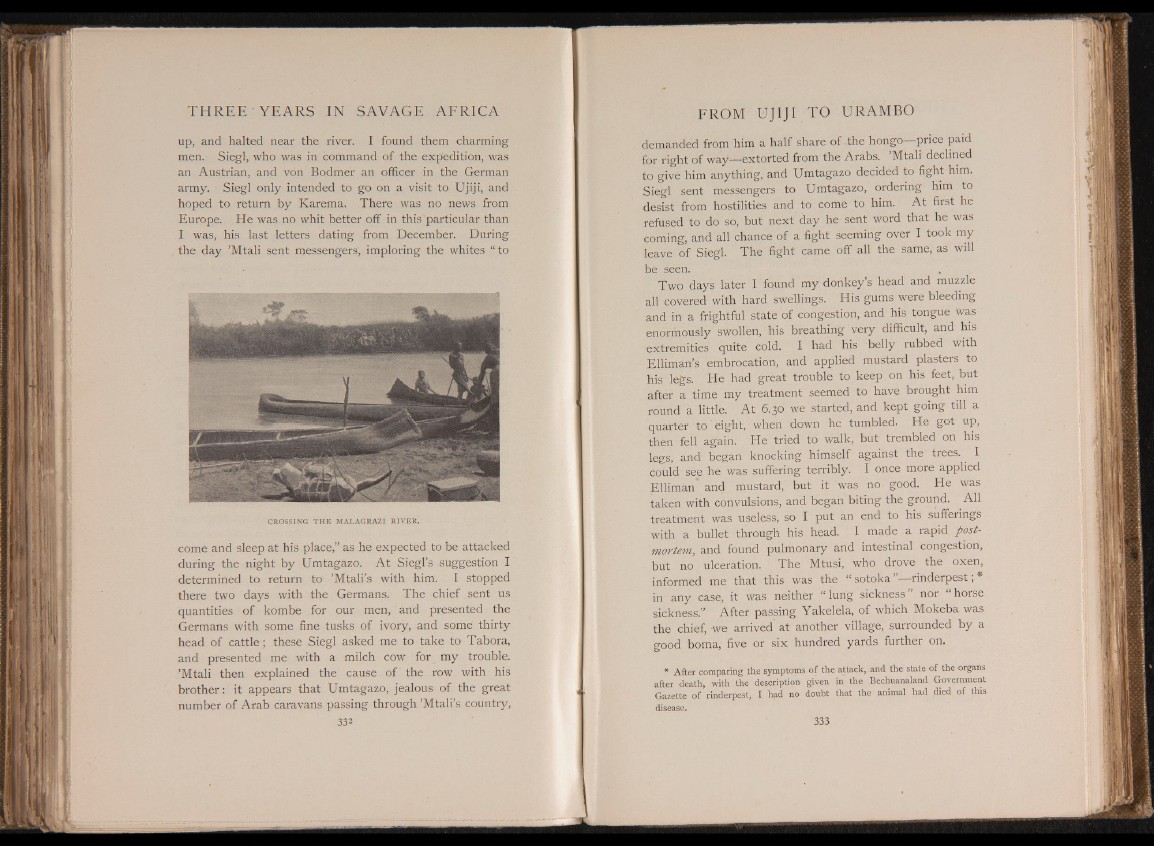
up, and halted near the river. I found them charming
men. Siegl, who was in command of the expedition, was
an Austrian, and von Bodmer an officer in the German
army. Siegl only intended to go on a visit to Ujiji, and
hoped to return by Karema. There was no news from
Europe. He was no whit better off in this particular than
I was, his last letters dating from December. During
the day ’Mtali sent messengers, imploring the whites “ to
CROSSING TH E MALAGRAZI R IV E R .
come and sleep at his place,” as he expected to be attacked
during the night by Umtagazo. At Siegl’s suggestion I
determined to return to ’Mtali’s with him. I stopped
there two days with the Germans. The chief sent us
quantities of kombe for our men, and presented the
Germans with some fine tusks of ivory, and some thirty
head of cattle ; these Siegl asked me to take to Tabora,
and presented me with a milch cow for my trouble.
’Mtali then explained the cause of the row with his
brother: it appears that Umtagazo, jealous of the great
number of Arab caravans passing through ’Mtali’s country,
demanded from him a half share of the hongo price paid
for right of way—extorted from the Arabs. ’Mtali declined
to give him anything, and Umtagazo decided to fight him.
Siegl sent messengers to Umtagazo, ordering him to
desist from hostilities and to come to him. At first he
refused to do so, but next day he sent word that he was
coming, and all chance of a fight seeming over I took my
leave of Siegl. The fight came off all the same, as will
be seen.
Two days later I found my donkey’s head and muzzle
all covered with hard swellings. His gums were bleeding
and in a frightful state of congestion, and his tongue was
enormously swollen, his breathing very difficult, and his
extremities quite cold. I had his belly rubbed with
Elliman’s embrocation, and applied mustard plasters to
his legs. He had great trouble to keep on his feet, but
after a time my treatment seemed to have brought him
round a little. At 6.30 we started, and kept going till a
quarter to eight, when down he tumbled. He got up,
then fell again. He tried to walk, but trembled on his
legs, and began knocking himself against the trees. I
could see he was suffering terribly. I once more applied
Elliman* and mustard, but it was no good. He was
taken with convulsions, and began biting the ground. All
treatment was useless, so I put an end to his sufferings
with a bullet through his head. I made a rapid postmortem,
and found pulmonary and intestinal congestion,
but no ulceration. The Mtusi, who drove the oxen,
informed me that this was the “ sotoka rinderpest,
in any case, it was neither “ lung sickness” nor “ horse
sickness.” After passing Yakelela, of which Mokeba was
the chief, we arrived' at another village, surrounded by a
good boma, five or six hundred yards further on.
* After comparing .the symptoms of the attack,.and the state of the organs
after death, with the description given in the Bechuanaland Government
Gazette of rinderpest, I had no doubt that the animal had died of this
disease.